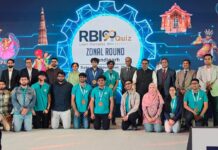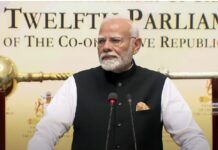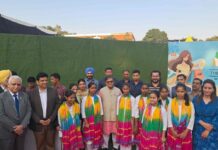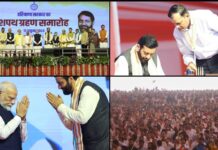” Empowered Women Makes Self-Reliant Nation” — Smriti Zubin Irani at a Webinar by PU
“The vision of a Self-Reliant India is not possible without an empowered womanhood”, said Smt. Smriti Zubin Irani, Hon’ble Union Cabinet Minister of Textiles and Women and Child Development, GOI while addressing a webinar on the theme of ‘The Resolve of Self-Reliant India: Decisive Role of Women Empowerment in its Attainment’ , organized by the Department of History and Interdisciplinary Centre for Swami Vivekananda Studies, Panjab University, Chandigarh on July 25, 2020.
She delved that in present times, Prime Minister’s Jan Dhan Yojana has played an instrumental role in empowering women as out of the 38 crores new bank accounts opened, 20 crore accounts were in the name of women. This access to bank accounts has fulfilled the task of becoming a fundamental financial tool which has gone a long way towards empowering women. Further, in Mudra Yojana, over 75 per cent beneficiaries of the scheme have been women. Though the schemes have given empowerment to millions of women yet the government is committed to bring cent per cent results. The Hon’ble Minister also spoke of how the Skill diversification and upgradation can help women achieve success. There is the need to involve larger numbers of girl children in pursuing Technology, Science, Maths and Research. Smt. Irani hailed Technology as an instrumental vehicle to bring everyone culturally closer. She pointed out that the pandemic has forced us to introspect and go back to basics like our cultural ways of boosting immunity and disease resistance.
Smt. Smriti Irani stressed that Indian society must revert back to Indian way of thinking in which an Indian woman, in contrast to western construct, was not a mere object or a person in servitude but an equal partner who participated in debates and wrote treaties. She may be seen as one who fed the starved and also fought with bravery while having her son tied to her back. Smt. Irani spoke of ‘Access to capital’ and ‘Access to skill’ as the two areas where women need to be encouraged. In traditional households, she remarked that a business venture by a male would attract capital even by sale of personal jewellery by women of the family. However, women’s efforts would fail to yield the same response.
Padam Shri Smt. Malini Awasthi, Professor and Folk Singer, delved on the cultural contexts in her talk. She highlighted the fact that Indian cultural values were carried forward through millions of grand-mothers and mothers who taught the values of valour, service to the society and motherland through folk singing. She spoke of how important it was to change the thrust of the cultural narrative which has always been against women. When she started her folk singing, there were commonly heard songs focusing on only cosmetics, the pains and troubles of womanhood, reliance of women on men etc. She unearthed many songs which spoke of women empowerment and their active contributions in larger domains. She talked of the local folk songs of UP, but she has discovered a lot of pain in the folk songs. Songs were either limited to exploitation, social discrimination or demanding personal products like cosmetics etc. Women are empowered today but the need of the hour is to change the mindset of the men in particular and the people in general. Smt Malini Awasthi appreciated the Prime Minister’s initiative of ‘Vocal for Local’ which has put this issue in the forefront and in the centre stage. She shared her experiences while working with rural women all around the country. The rural economy is full of examples and even the data supports the fact that women are the active and major contributors in every sphere of rural economic and social life. She spoke of how skill diversification in arenas’ such as agro-processing and crafts can really help in transformation of the rural landscape.
Smt. Anar Patel, a distinguished Social Worker and the founder of Social NGO,Gramshree highlighted, how guided, with the vision of self-empowerment, she has witnessed the efficiency and adaptability of women at the ground level and how simple ventures have yielded significant results and generation of capital for the people on the ground.
The Vice-Chancellor, Prof Raj Kumar in his address, highly appreciated the gracious initiative of the Honourable Minister, Smt. Smriti Zubin Irani for gracing the webinar, and spared her valuable time in sharing her words of wisdom. He welcomed the Guests of Honour, Padam Shri Smt. Malini Awasthi and Smt. Anar Patel as well as all the participants. He considered the three lady panelists to be blessed by Mother Goddess herself as they have made significant contributions in the service of their motherland. Prof. Raj Kumar expounded on the increasing but eternal importance of women empowerment in any society if it is to thrive. He spoke of how Women have always been able to seamlessly manage multiple responsibilities and challenges and work effectively to keep their homes, families, communities and society well-integrated and well-organised. He appreciated and applauded the persistent efforts of the Department of History and Interdisciplinary Centre for Swami Vivekananda Studies in organizing Webinars and Web Lectures at challenging times like these which also present unique opportunities.
Dr. Anju Suri, Professor and Chairperson of the Department of History introduced the theme and moderated the proceedings. In her welcome address, she expressed the profound joy and pride at the presence of eminent personalities and the Hon’ble Minister, Smt. Smriti Irani for interacting with students, faculty members and researchers all over the country from the platform of the Panjab University. Professor Anju Suri also expressed her elation at the Guests of Honour, Smt. Malini Awasthi and Smt. Anar Patel who lent their illustrious presence to the webinar.
The webinar was attended by 580 participants and luminaries from across the country. The webinar was remarkable for the quality of information, pertinence of the various viewpoints which were put forward by the distinguished speakers, its comprehensive nature, cross disciplinary and strongly culturally rooted bearings and extremely informative deliverables. The highly incisive and comprehensive webinar was followed by a Session of Queries and Observations conducted by Dr. Vishal Sharma. The Vote of Thanks was delivered by Professor Renu Thakur, Coordinator, ICSVS who expressed gratitude to the eminent speakers as well as the academicians, scientists, researchers, students and faculty members from many departments and Universities across India who joined the webinar.






















